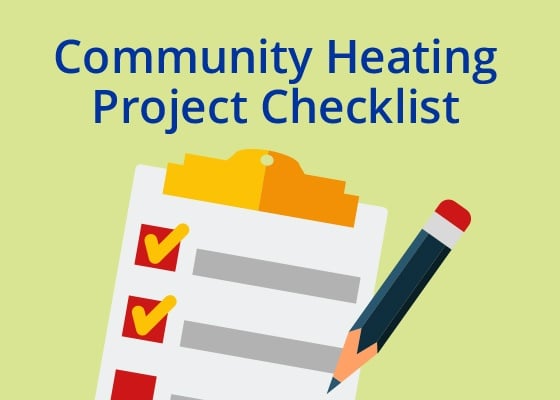Why use the Switch2 Checklist?
 Creating an efficient and effective community heating system is a big task.
Creating an efficient and effective community heating system is a big task.
Our expert advice will help you plan and build it with more confidence.
Where will you get your heat from?
Search the map provided by the Association for Decentralised Energy (ADE) or check out The Department for Business, Energy & Industrial Strategy’s survey of existing schemes.
If your area is listed, you will be able to save money and carbon on your scheme.
Are there planning requirements from the local authority?
Large new schemes in your council might need to meet:
- A carbon reduction target - which is the best reason for using biomass on your development due to the grants (see next slide). Joining a local district heat network can also help to reduce carbon.
- The requirement to consider connecting to a coming district heating network - such as the emerging Lee Valley Heat Network scheme in Enfield. Area developers need to come up with a commercial case for not joining the network.
Have you made a strong financial case?
The government’s Renewable Heat Incentive (RHI) pays generators so they can overcome the higher costs of boilers and fuel. Producers of solar PV can also benefit from government funding.
There is a wealth of information online about the RHI - not least from suppliers of wood fuel and the boilermakers that consume it. So make sure someone is researching it.
Why do you need to select the right consultant?
Community Heating, especially the building networks is not as common in the UK as it is on the Continent and in Scandinavia, so you need to take care to select a design consultant who has sufficient experience and understands your needs.
Tailoring heat requirements in community heating is a precise science, and you might have to find a specialist consultant to find an engineer with hands-on experience.
Protect your design and long term interests against value engineering?
The best-planned community heating scheme is in peril when contractors try to save money on construction schemes. Builders are under a lot of pressure from clients to value engineer schemes.
To prevent this, clients should exclude community heating from having costs stripped out during the design and build process.
One solution is to put in place a frame work for community heating specification across all your developments.
Is your metering system reliable?
Collecting data, web-based billing, commissioning automatic meters….
The responsibilities of the Heat Supplier are many and varied. And every link in the
chain has to be kink-free and well-oiled.
Getting something wrong means incorrect bills, unhappy customers and missed payments. A PAYG system is the obvious answer to these problems.
A one-stop shop should be considered because it puts responsibility for customer satisfaction in one place and will allow issues to be resolved quickly.
Do residents know how much they’ll be paying and what for?
Homeowners and tenants must have absolutely no surprises about the costs they will be paying for their heat utility.
Potentially high standing charges and a locked-in system mean landlords and scheme operators need to communicate openly with their potential renters and buyers.
Make sure lease or sale terms and conditions include heat sale agreements which cover these charges.
Does the Government know about your plans and financial data?
A duty under the Heat Network Regulations 2014 is that all schemes must be reported to the The Department for Business Energy & Industrial Strategy on behalf of the Government. This template allows you to do this.
Heat suppliers should also report key information annually, including price data. This is a matter of public benefit and supports the growth of the industry – helping everyone.
Do you know how efficient your system is?
The development contract must include specifications which show your scheme is efficient. These should be protected by a framework agreement.
Efficiency and cost to the residents is becoming a hot topic and should be addressed in your specification. You need to make sure your consultant engineers put measures in place so the system’s efficiency can be monitored and maintained on an ongoing basis.
Can your customers have faith in you?
As well as the requirement to register your new heat network with the Government, (see slide 8), consider registering with the Heat Trust.
The new organisation calls itself a “ voluntary, industry led, self-regulation initiative that recognises best practice.” It requires heat providers to provide standardisation and best-practice in all areas of heat provision.
The aim is to make it “comparable to the quality and performance standards for regulated utilities.”The more schemes joining, the less chance of regulation.
Are your bills transparent?
Scheme operators are required to provide billing to residents by law. But bills can still be confusing and lack clarity.
Make sure that consumers understand what they are paying for, as well as how the cost of their heat compares with having a boiler.
Takeaways:
- Your scheme must be properly funded with the correct grants to make it stack up.
- You need to make sure your consultants specify the correct equipment and create a system that is and can remain efficient.
- The best (and only) way to treat customers is to give them a good deal, be transparent about what they paying for and build their trust.



